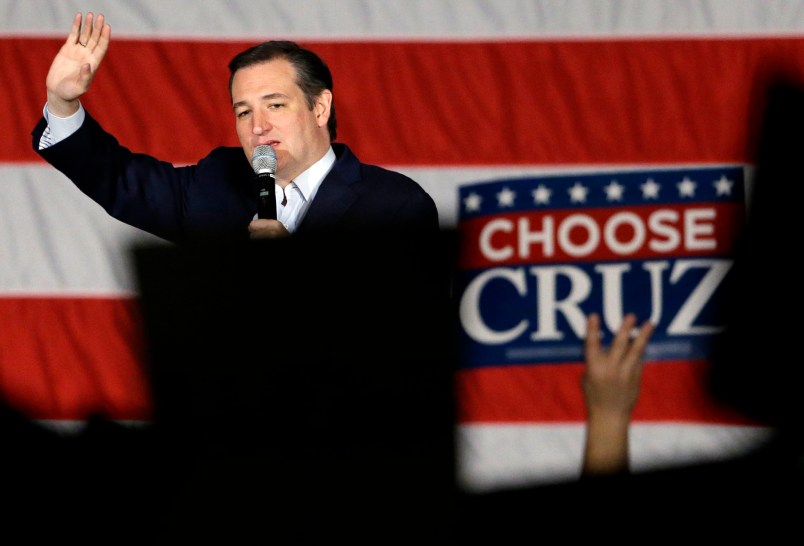DENVER (AP) — While the focus of the Republican presidential campaign shifts eastward to the New York primary, Texas Sen. Ted Cruz is pivoting west, where he is quietly trying to chip away at Donald Trump’s lead in the race for convention delegates.
Cruz won six pledged delegates during a pair of obscure, congressional-level Colorado GOP assemblies on Saturday. He is also poised to make gains in several other western Republican contests, including a possible sweep of Colorado’s remaining assemblies, due to conclude Saturday. Cruz’s success in the complex delegate game is helping him counter Trump’s headline-grabbing wins in big states and would give the Texas senator a tactical advantage should the party’s presidential nomination come down to a rare contested convention.
“Cruz is ahead of everyone on this,” Republican election lawyer Ben Ginsberg said, describing Cruz’s aggressive but quiet delegate strategy as “equally important” to the actual votes.
Cruz has racked up some outright popular vote victories, most recently by soundly winning Wisconsin’s primary Tuesday and squeezing Trump’s narrow, but achievable, path to the nomination. Still, Trump is heavily-favored in the upcoming round of northeastern primaries, especially in the billionaire’s home state of New York on April 19.
That’s why Cruz’s team has been busy at work in states like North Dakota, where conventiondelegates are selected directly by party officials.
These tedious, complicated and insider-heavy events are key to the party’s organizational structure, a concept new to Trump but not to Cruz, who rose to prominence in Texas through the GOP’s grassroots.
Trump’s campaign did not respond to a request for comment, but he has previously complained that caucuses are unrepresentative, and said that delegate fights are tricks to subvert the voters’ will.
Cruz has outmaneuvered Trump in all the caucus states, beginning in Iowa. In North Dakota last week, he scooped up endorsements from delegates selected at the party’s state convention Saturday.
All 28 of North Dakota’s delegates will go to the national convention free to support the candidate of their choice. But in interviews, 10 said they are committed to vote for Cruz at the convention. A few others said they are leaning toward Cruz, though they weren’t ready to commit.
None has endorsed Trump so far.
In Colorado, Cruz is taking advantage of an unusual change to the state’s nominating process. Rather than selecting delegates according to a statewide vote, as it has in the past, Colorado is holding a series of rolling caucuses this week in each of its seven congressional districts, then culminating with a statewide convention on Saturday where Trump and Cruz are expected to speak.
Colorado Republican operatives say that, just by winning the congressional gatherings, Cruz could lock down a majority of the 34 delegates up for grabs, even before Saturday’s convention.
“Cruz has the big upper hand here,” said Ryan Lynch, a Colorado-based Republican consultant unaffiliated with any of the presidential campaigns. “They’re the only ones really organized.”
That was apparent on Saturday when a slate loyal to Cruz swept the first two congressional district assemblies. A slate is a group of candidates that run in multi-seat elections on a common platform. Members of the slate had strategized with Rep. Ken Buck, Cruz’s Colorado chairman and a veteran politician well-connected among the state’s Republican primary electorate.
The Cruz campaign sent out emails on their behalf to delegates who had been selected at earlier precinct-level meetings, and slate members worked the phones and lobbied those delegates further for support.
“It was kind of like running a classic campaign — talking to as many people as possible, working it,” said state Rep. Justin Everett, one of Cruz’s delegates. “We’re probably only a $500 investment. We didn’t see much from the Trump campaign in terms of an investment.”
Cruz has not had a heavy paid-staff presence in Colorado. Instead, a pro-Cruz volunteer network has been coordinating closely, said former Colorado Secretary of State Scott Gessler.
“Cruz has an organized slate. But you can’t beat the shoe leather aspect of it,” said Gessler, a Cruzdelegate from Denver. “I made about 250 phone calls. I don’t know if I’d have won if I hadn’t made those phone calls.”
The remainder of Colorado’s delegates will be chosen at district conventions Friday and the state convention Saturday in Colorado Springs.
Cruz’s delegate strategy stretches beyond North Dakota and Colorado. He campaigned through swing regions of Wisconsin long before Trump set foot there. He also locked up support from almost all of Milwaukee’s conservative talk radio personalities, giving him a free mouthpiece aimed at roughly 40 percent of the state GOP’s primary voters.
Likewise, Cruz supporters are organizing in Iowa this week. Cruz won the proportionally binding caucuses on Feb. 1, but stands to gain delegates in the Iowa GOP’s district conventions on Saturday.
While Trump remains the closest to the 1,237 delegate target for now, he’s not taking it for granted. His campaign announced last week the hiring of Paul Manafort to run his convention effort, includingdelegate strategy.
Likewise, Trump said he would open a convention-planning office in Washington, D.C., to also house its delegate-selection team.
————————
Beaumont reported from Des Moines, Iowa. With assistance from Stephen Ohlemacher in Washington.
Copyright 2016 The Associated Press. All rights reserved. This material may not be published, broadcast, rewritten or redistributed.







ted knows how to do the weasel with the worst of them.